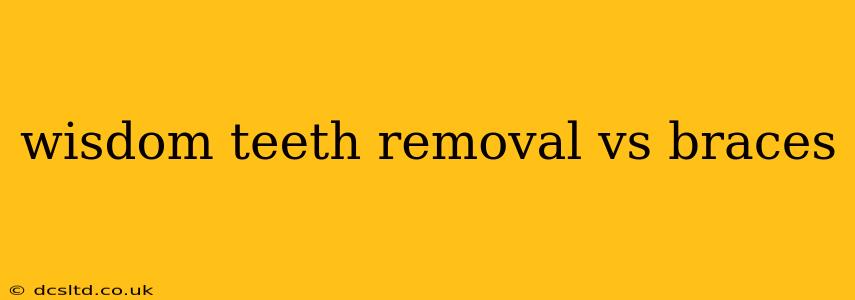Deciding between wisdom teeth removal and braces can be a confusing process. Both procedures impact your oral health, and the order in which you tackle them significantly affects the overall treatment plan and timeline. This comprehensive guide will delve into the intricacies of each procedure, comparing them and helping you understand which should generally take precedence.
What are Wisdom Teeth?
Wisdom teeth, also known as third molars, are the last teeth to erupt in the mouth, usually between the ages of 17 and 25. Often, there isn't enough space in the jaw for these teeth to emerge correctly. This can lead to impaction (where the tooth remains trapped beneath the gum line or bone), overcrowding, or misalignment, potentially causing pain, infection, or damage to adjacent teeth. Removal is often recommended to prevent these complications.
Why Get Braces?
Braces are orthodontic appliances used to straighten teeth and improve bite alignment. They address various issues, including overcrowding, gaps between teeth, overbite, underbite, and crossbite. Straightening teeth not only enhances aesthetics but also improves chewing function, reduces the risk of gum disease and tooth decay, and contributes to overall oral health.
Wisdom Teeth Removal: The Procedure and Aftercare
Wisdom teeth removal is a surgical procedure performed under local anesthesia or general anesthesia, depending on the complexity of the case. The surgeon extracts the impacted teeth, and post-operative care involves managing pain, swelling, and bleeding. Recovery time varies but typically takes several days to a couple of weeks. Instructions will usually include a soft food diet and careful oral hygiene.
Braces: The Process and Considerations
Braces involve attaching brackets to the teeth and connecting them with wires to gradually shift them into the desired position. Regular adjustments are necessary, and the entire process can last anywhere from 12 to 36 months. Maintaining good oral hygiene is crucial to prevent cavities and gum disease during treatment.
Wisdom Teeth Removal vs. Braces: Which Should Come First?
This is the million-dollar question. The order largely depends on individual circumstances, but generally, wisdom teeth removal often precedes braces. Here's why:
-
Preventing complications: Removing impacted wisdom teeth before starting orthodontic treatment prevents potential complications. The presence of impacted wisdom teeth can hinder the effectiveness of braces and might even necessitate further surgical interventions during or after orthodontic treatment.
-
Creating space: Removing wisdom teeth can create more space for existing teeth to align properly during orthodontic treatment, leading to a more efficient and potentially shorter treatment plan.
-
Easier orthodontic treatment: Once wisdom teeth are removed, the orthodontist has a clearer picture of the jaw and teeth alignment, which can simplify brace placement and improve treatment outcomes.
However, there might be exceptions: In some cases, braces might be started first if the wisdom teeth are not impacted or if there are no significant concerns about their eruption. The decision is always made on a case-by-case basis after a thorough examination by both an oral surgeon and an orthodontist.
What if I have impacted wisdom teeth and need braces?
If you have impacted wisdom teeth and require braces, the general consensus is to have the wisdom teeth extracted first. This avoids potential disruptions to the orthodontic treatment plan and ensures a more successful and predictable outcome.
How long does recovery take from wisdom teeth removal before starting braces?
The recovery time after wisdom teeth removal varies but typically requires several weeks before starting braces. Complete healing and stable jawbone conditions are necessary before proceeding with orthodontic treatment. Your oral surgeon will provide guidance on the appropriate waiting period.
Can I get braces while healing from wisdom teeth removal?
No, it’s generally not recommended to start braces immediately after wisdom teeth removal. Adequate healing time is needed to ensure proper jawbone and gum tissue healing, to avoid discomfort and potential complications during brace placement and adjustment.
What are the costs involved?
The cost of wisdom teeth removal and braces varies depending on factors such as the complexity of the procedure, location, and insurance coverage. It's best to consult with your oral surgeon and orthodontist to get a detailed estimate for both treatments.
In conclusion, the decision of whether to get wisdom teeth removed before or after braces is a crucial one, best addressed by consulting professionals for a personalized treatment plan. Understanding the nuances of both procedures empowers you to make informed decisions regarding your oral health.
